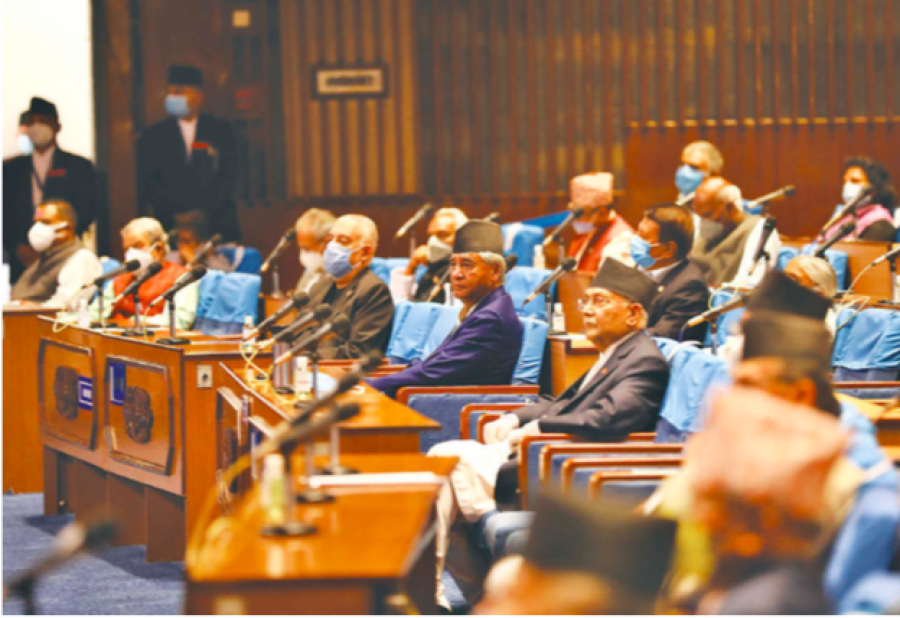National
Janata Party and Samajbadi Party register private constitution amendment bill of their own
The regional parties propose amendments to 23 issues that are aimed at addressing the long-standing concerns of the Madhesis, Tharus and Janajatis.
Tika R Pradhan
A day after the government tabled a constitution amendment bill, the Rastriya Janata Party Nepal and the Samajbadi Party Nepal, two parties that have long been demanding constitutional amendments, jointly registered a private amendment bill of their own at the Parliament Secretariat.
“We have registered a joint constitution amendment bill seeking amendments on 23 different issues,” said Rajendra Shrestha, co-chair of the Samajbadi Party.
A majority of their demands remain the same—amendments to provisions related to language, citizenship, proportional representation, formation of autonomous regions, protected regions and non-geographical special regions, an expanded role for the deputy speaker in the absence of the Speaker as well as a change in the governance system with directly elected President, among others.
The Janata Party’s bid to register the bill earlier on Friday had been turned down by the Parliament Secretariat, saying it needed to consult with the Speaker.
Top leaders from the two parties, which have already agreed to unite to form the Janata Samajbadi Party, had decided on Saturday to register a new bill jointly, by incorporating the demands of the Samajbadi Party. A meeting on Saturday had entrusted Shrestha and Janata Party chief whip Laxman Lal Karna with the task of making necessary changes to the amendment proposal.
The two parties started to once again raise their demands for constitutional amendment when the government on May 22 registered a bill in Parliament, seeking to amend Schedule 3 of the constitution to update Nepal’s new political map in the national emblem.
The government on May 20 released a new political and administrative map of Nepal including Kalapani, Lipulekh and Limpiyadhura, territories that India too claims as its own.
According to leaders, the amendment proposal is expected to create pressure on the ruling party to look into the concerns raised by different sections of society, including the Madhesis, Janajatis and Tharus.
The two Madhes-based parties, which have 17 seats each in Parliament, registered a private amendment proposal a day after the primary opposition Nepali Congress decided to re-register a three-year-old amendment proposal brought by the then Sher Bahadur Deuba-led coalition government, which was supported by the Maoist Centre, then led by Pushpa Kamal Dahal.
The bill, however, had failed to pass after the CPN-UML, then led by prime minister KP Sharma Oli, objected.
The Samajbadi and Rastriya Janata parties had sought the Congress’ support to getting their concerns addressed as well.
The two parties have not objected to the government’s amendment proposal but are seeking a package deal so that their concerns can also be incorporated into the amendment bill.
“If the ruling party does not support our bill, we can also ask why we should support theirs,” said Karna, the Janata Party chief whip. “The private bill that the main opposition Nepali Congress is going to register will create further pressure on the ruling party.”
After registering its own amendment bill, the government had decided to wait for some time before tabling it, saying it wanted to build a national consensus on the matter.
Prime Minister KP Sharma Oli had even called an all-party meeting on May 26 in a bid to forge national consensus, arguing that amending the constitution to update the map on the national emblem needed the support of parties from across the spectrum.
The bill can easily clear both the 275-strong House of Representatives and the 59-member National Assembly, as the Nepali Congress has already asked its parliamentarians to vote in favour. With the Congress’ support, the ruling Nepal Communist Party (NCP) has the required numbers in both chambers.
Rajendra Mahato, a leader in the six-member praesidium of the Janata Party, said that the question is not whether the government’s amendment bill will go through but how the parties will address their long-standing demands for constitution amendment.
“A nation does not only mean the geography; the people make up its important constituency and their concerns must also be taken into consideration,” Mahato told the Post.
While some say the Samajbadi Party and Janata Party now are using their amendment proposal as a bargaining chip as they cannot block the government’s amendment bill, others say their proposal carries symbolic value.
“The government’s amendment proposal shows that the ruling party can amend whatever they like and whenever they want, but they won’t consider longstanding concerns that people have sacrificed their lives for,” said CK Lal, a political commentator.
The joint amendment bill, however, is likely to remain symbolic, said Lal, as the ruling party is unlikely to vote in favour, given its past reluctance to address the demands, and the opposition Nepali Congress’ plan to present its own amendment bill.




 17.12°C Kathmandu
17.12°C Kathmandu














